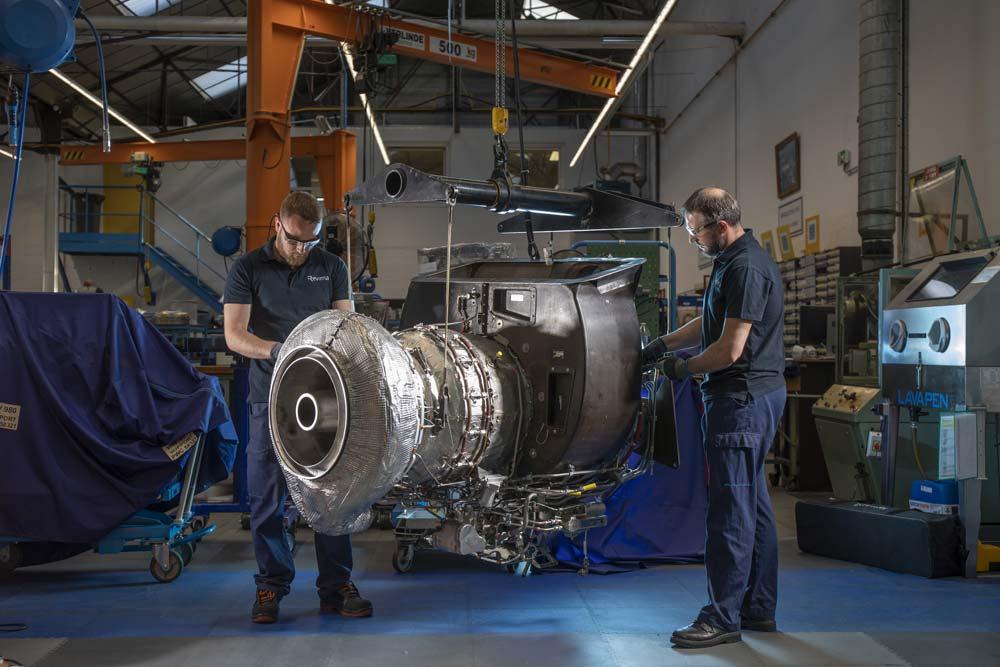
Revima's latest digital solutions focus on APU performance.
France-based MRO provider Revima Group has unveiled three new digital tools for auxiliary power units (APUs) as it looks to ramp up its digitalization efforts with airline customers.
The company, which specializes in APUs, landing gear and engine component repairs, developed the tools with its Toulouse-based real-time data processing and digital solutions subsidiary FlightWatching.
Olivier Legrand, Revima Group president and CEO, says he has long envisaged the repair specialist moving beyond conventional maintenance, which has resulted in the company growing its digital presence over the past five years since acquiring digital startup FlightWatching in early 2019. “We want to contribute actively to the performance of our customers and go beyond merely MRO,” he told Aviation Week Network.
Of the newly announced services, first is Effifuel, which will be rolled out to its customer base as a fuel saving solution that helps operators identify overuse of APUs and therefore reduces fuel consumption while minimizing the related environmental footprint. Revima says it allows operators to visualize APU usage in real-time while enabling them to take immediate actions in the event of a need for maintenance.
Second, it has developed Opticooling, a digital solution to help customers assure the right cabin temperature for when passengers board the aircraft. The tool’s algorithms offer a precise calculation of the optimum time to start the APU before boarding, taking into account ambient air temperature, number of passengers and desired temperature in various cabin sections.
A third offering is Predicare, a predictive maintenance solution designed to monitor the condition of APUs and predict early impending failures before they occur. Revima says this targets improved maintenance costs and dispatch reliability while helping carriers better predict the lifecycle of their APU.
“This platform has an artificial intelligence engine in it that produces automatic alerts that are filtered by a specialist team,” Legrand says, adding that it will typically be reviewed daily by a team of six people based in France. “They will be able to filter the messages that the system sends so that we can then send sound maintenance recommendations to the airlines,” he says. While Revima is no stranger to predictive maintenance over the years, Legrand says the company wanted to firm up its offerings in that segment and provide a broader scope of tools and guarantees to its customer base.
Legrand says the company has already worked with existing customers on digital tools and he expects Revima to further expand them to other functionalities in future.
Bringing new digital tools to the market coincides with a strong financial year for the company following a challenging recovery period in the first two years following the COVID-19 pandemic in 2020. This year, as demand increases for services, Revima is seeing large growth from its multi-faceted repair operations. Overall, it projects sales exceeding €400 million ($434.2 million) in 2024, a 30% increase from the previous year and on course to comfortably better its record sales figures of around €325 million in 2019.
Legrand says Revima expects APU maintenance to increase by around 25%, with a noticeable spike of between 10-15% in landing gear services for widebodies, which it carries out in France. Revima’s Chonburi, Thailand, landing gear facility, which opened in 2019, is expected to grow 50% this year. Meanwhile, its materials business located in Yainville, France, which deals in used serviceable materials, is expected to increase sales by between 30-35% in 2024.
While acknowledging the ongoing challenge of the aftermarket supply chain, Legrand says Revima has alleviated some capacity constraints related to landing gears by opening a designated light repair shop at its Yainville site, a few miles from its headquarters in Rives-en-Seine, which is home to its material solutions business. Like many in the industry, Revima is running close to capacity at most of its MRO shops and Legrand says being in this position has led to the company exploring ways to add further capacity to avoid turning away work requests.
“Landing gears have maintenance cycles of every 10 years or so, but the USM side of the business is more opportunistic, so there was a misalignment that needed to be addressed,” Legrand says. He sees the widebody segment bouncing back strongly, noting strong demand for Airbus A330 landing gear products specifically.
The company has also added to its workforce in 2024 across its sites in France and Thailand, with between 120-130 people coming on board this year. In total, Revima employs around 1,200 people across all its sites worldwide. Legrand says the labor market has changed since the pandemic, with a greater urgency to bring in more skilled labor than before the pandemic, when Legrand says Revima employed a more cautious hiring strategy. “The labor market has changed quite a bit since the pandemic, with aerospace being less attractive than it used to be,” he says, noting a more competitive and higher cost environment.
While not ruling out further expansions to boost capacity, Legrand says any moves to do so will be via acquisitions rather than greenfield sites like at its Thailand operation, which he says was an exception instead of a rule due to increased capacity requirements in the Asia-Pacific region.
“It will be by acquisition of the existing capacity, and it’ll probably be more toward the U.S. where we are not established right now,” he says. “While there is nothing to announce currently, we’d like to tap into some of those markets and also maybe look selectively in Asia-Pacific.”


